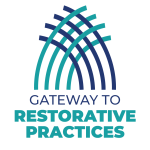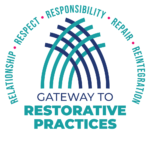The other day I was talking with a colleague about educators we work with who have wholeheartedly taken on restorative practices, not only in their education role, but in their home and relationships. One couple immediately came to mind. For this couple and we three trainers, restorative practices isn’t something we just do in our work role, it is, “A Way of Being.” We implement the restorative practices principles in our daily lives, in our relationships with others, parenting our children, and community involvement.
Later, I wondered, what restorative practices principles create the most power to change lives? I immediately thought of the fundamental hypothesis combined with fair process. This should not be a surprise because these are two of the six Pillars of Restorative Practices featured on my webpage Gateway to Restorative Practices.
What is the Fundamental Hypothesis?
In 2004, Ted Wachtel, President of the International Institute of Restorative Practices, presented his fundamental hypothesis in From Restorative Justice to Restorative Practices: Expanding the Paradigm. He said,

“The fundamental unifying hypothesis of restorative practices is disarmingly simple: human beings are the happiest, healthiest and most likely to make positive changes in their behavior when those in authority do things with them rather than to them or for them” (2004).1
We never get pushback on this concept during training.
- Nobody likes to be told what to do without choice;
- Nobody likes being ignored, isolated, or ostracized; and
- Most people don’t like others doing things for them that they could do themselves unless they are taking advantage of others.
When I ask participants what they think about the hypothesis, most everyone seems to like the concept that we do things “with” others. I think about “with” in terms of coming alongside someone: a scholar, a colleague, a family member, a grandchild, a neighbor, or anyone I encounter throughout my day. But using “with” alone isn’t enough to practice “A Way of Being.”
What is Fair Process?
There’s another fundamental statement that goes along with the fundamental hypothesis. If you’re like me you’ve likely heard whining statements centered on fairness, such as, “That’s not fair! Who decided that? Nobody asked me!” Even if decision makers’ intentions are good, the way decisions are made can lead to mistrust and divisive conflict.
Fair process is another fundamental concept from Ted Wachtel:
“Individuals are most likely to trust and cooperate freely with systems – whether they themselves win or lose by those systems – when fair process is observed.”1
Some people feel so strongly about fair process that when they are not a part of the decision-making process, they feel irritated. Mila Pilz, Advoz’s Executive Director says, “A catchy way to remember this is, ‘a decision made without me is against me.’”2 Fair process is a core element of change. Most people can live with the outcome if the decision-making process feels “fair.”
Be sure to check back in and get the second part of this blog that features how to use the three ‘E’s of fair process and inclusive decision-making.
Sources:
- Wachtel, Ted. From Restorative Justice to Restorative Practices: Expanding the Paradigm. August 5, 2004. https://www.iirp.edu/eforum-archive/from-restorative-justice-to-restorative-practices-expanding-the-paradigm
- Pilz, Mila. 2019. Kind Words, Kind Hands, Kind Feet: Fair Process for 3- or 93-year-olds. June 10. https://advoz.org/2019/06/10/kind-words-fair-process-3-year-olds/
- Image source: with-walk-to [walkwithGod.org].

